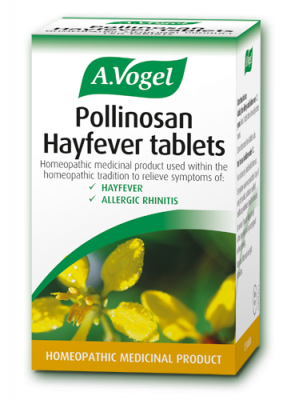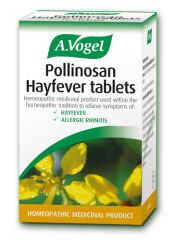How healthy are you?
Take our quick quiz to discover just how healthy your immune system is, as well as some useful information about your general health and wellbeing!
Check nowFrom watery eyes, to swelling, to congestion, allergic rhinitis has symptoms that crop up all over the body. However, here our allergy advisor Louise Baillie focuses on sneezing which, as any allergic rhinitis sufferer knows, can be frustrating. To help you out, she provides details about how to address the problem and what treatments are available.
An over-sensitive immune system causes the problem of allergic rhinitis because, instead of ignoring things like pollen, animal dander, dust mites and mould spores, it reacts to them. In fact, the immune system doesn’t just react to these things, it deems them as dangerous and so does its upmost to destroy them. This involves various actions, including releasing the chemical histamine which causes issues like inflammation and swelling. However, the nose also becomes a focal point for fighting these allergens. The mucous membranes that line the inside of the nose for example, increase their production of mucus in an attempt to trap and wash out allergens.
A sneeze is just a strong burst of air that goes through the nose and mouth but, for those with allergic rhinitis, it can become a regular and troublesome issue. It occurs because allergens irritate the lining of the nose and as a result, the body deploys a reflex mechanism in the form of a sneeze to get rid of them. It usually takes about two to three sneezes before the body has got rid of all the so-called dangerous allergens trapped in the nose.
Sneezing is often a sign of a cold or flu so it can be challenging to decipher whether it is this or allergic rhinitis that’s the cause. There are however, a few things that will help you to distinguish which is at the root of your symptoms.
How often do symptoms appear? – The frequency of sneezing tells us a lot about what’s behind the problem. Most people only have a few colds a year where they experience this issue but for those with allergic rhinitis, sneezing is much more regular, and at times may feel continuous.
When do symptoms appear? – As mentioned, pollen is a common cause of allergic rhinitis so if sneezing worsens between March and June when plants pollinate, this indicates that allergic rhinitis rather than a cold is the cause.
Where do your symptoms feel worse? – If you regularly suffer from sneezing, you may begin to notice that there are places where the problem gets worse. Dust mites, animal dander and mould may exacerbate symptoms indoors for example, where they are prominent.
If allergic rhinitis causes regular sneezing, there are a range of things you can do to ease the problem.
Give your immune system a helping hand – allergic rhinitis puts the immune system under a great deal of strain as it must regularly fight off allergens. So, to provide it with some support, and to help stabilise it, it can be helpful to take Echinacea in the form of Echinaforce Echinacea Drops. If you know pollen is the cause of your allergic rhinitis, as a means of preparation for hayfever season, it can be helpful to take Echinaforce two to three weeks before this period.
Reduce your exposure to the allergen – if you are able to avoid an allergen, your body will have nothing to react to and your symptoms should ease. It can be challenging to find the exact cause of allergic rhinitis but if you consider the points above, this should help to narrow it down. Failing that, a trip to the doctors for an allergy test will reveal the cause of your allergic rhinitis.
Rinse your nose with a salt water solution – a salt water solution can be obtained from a pharmacist or you can choose to make your own with half a teaspoon of bicarbonate soda, half a teaspoon of salt and a pint of boiling water. In order to rinse your nose, once the liquid has cooled, pour it into a neti pot. This is a container designed to rinse out debris and mucus from your nasal cavity. It can be very beneficial for helping to relieve sneezing and for treating symptoms of nasal allergies and sinus problems. A neti pot should come with a set of instructions so follow these to rinse your nose in the most effective way possible.
For a helping hand in treating your allergic rhinitis, it can be useful to try herbal remedies, of which there are a variety of types.
Pollinosan nasal spray – to help reduce the problem of sneezing, this nasal spray rinses and cleanses the nasal passages of allergens like animal dander and pollen. It also restores fluid and moisture in the nasal passages thus making the nose feel more comfortable.
Pollinosan hayfever tablets – these tablets, which contain seven tropical herbs, can be used to treat allergies to pollen, animal dander, mould spores and dust. It also addresses a variety of allergic rhinitis symptoms, including sneezing.
If symptoms of allergic rhinitis are persistent and particularly troublesome then it may be time to visit your doctor who can offer a few other treatment options.
Antihistamines – for the general treatment of allergic rhinitis, doctors and pharmacists often recommend antihistamines as they block the release of histamine which causes so many of the problems associated with allergic rhinitis.
Corticosteroids – a nasal spray containing corticosteroids can be obtained from a doctor and is very often used to for to treat those with allergic rhinitis as it helps inflammation and swelling. Whilst this doesn’t deal with the problem of sneezing directly, it does address some of the other symptoms associated with allergic rhinitis such as a runny nose and inflammation which often accompany this issue.
 Looking for a solution to curb those hayfever symptoms such as itchy eyes, constant sneezing and congestion, then look no further than A.Vogel’s Pollinosan Hayfever tablets.
Looking for a solution to curb those hayfever symptoms such as itchy eyes, constant sneezing and congestion, then look no further than A.Vogel’s Pollinosan Hayfever tablets.
To find local independent stores in your area that sell Pollinosan, just type your postcode below.
This product can also be found in your local Holland & Barrett.

Take our quick quiz to discover just how healthy your immune system is, as well as some useful information about your general health and wellbeing!
Check nowStay up to date with the latest pollen information by finding your local pollen forecast from over 30,000 locations across the UK.
Get your local pollen count nowWhat you drink can have a big impact on the extent of your allergic rhinitis symptoms. From herbal teas to fruit juices find out which could help you most.
8 tasty drinks that could help allergic rhinitisDiscover the story of Alfred VogelNature is just about the best thing we’ve got!